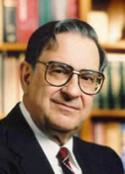Dr. Rosse is Florence McAlister Professor of Medicine Emeritus, Duke University, and past president of ASH.
Ernest Beutler, MD, was born in Berlin, Germany, in 1928. With the advent of Hitler, he and his family moved to the United States in 1935 and settled in Milwaukee, WI. At age 15, he went to college at the University of Chicago. The intellectual character there fitted his keen mind and he remained at the University of Chicago for medical school and house staff training. He was attracted to hematology by the force of personalities of hematologists at Chicago, particularly Leon Jacobson, and, when he was commissioned as a Second Lieutenant in the Army, he was assigned to work with the Malaria Research Project, where he investigated the abnormality of the red cells that resulted in hemolytic anemia when primaquin was ingested. He noted that these cells had more Heinz bodies than normal when treated with certain chemicals, including iodacetamide. He deduced and then proved that glutathione was more easily oxidized and, from this, that the enzyme glucose-6-phosphate dehydrogenase (G-6-PD) was diminished, opening an entire field of endeavor in hematology and genetics. The defect was shown to be X-linked, and, from the great heterogeneity of expression in obligate heterozygotes, he independently deduced that they must be variable chimeras due to the suppression of one or the other X chromosome in individual cells. This insight led to the demonstration of clonality in some tumors and in paroxysmal nocturnal hemoglobinuria (PNH) before more refined molecular genetic tests were available.
From Chicago, Dr. Beutler moved to the City of Hope in Duarte, CA, for 18 years, and then ultimately to the Scripps Clinic and Research Foundation in La Jolla, where he remains. His research has been far-ranging and yet nearly always related to the red cell. His early interest in iron deficiency later emerged in extensive and influential studies of hemochromatosis. His interest in enzymes led to consideration of other deficiencies besides G-6-PD and into galactosemia and Gaucher disease; he cloned the gene for the latter disease and developed replacement treatment for it. His interest in red-cell preservation stemmed from a clinical need and a curiosity about cell aging. While at City of Hope, he, along with Karl Blume, was one of the pioneers in bone marrow transplantation and showed that it could be used effectively in the first remission of AML. In all, he has authored more than 800 publications, 19 books, and more than 300 book chapters of enormous influence on hematology. It has been correctly stated that he is not constrained by conventional thinking, and he has had the satisfaction of seeing that his approach and his thinking have been confirmed time and time again.
In addition to his leadership in scientific advancement, Dr. Beutler has played a highly significant role in the promotion of the field of hematology. He has trained many students who are universal in his praise. He has occupied many positions of influence, including that of president of the American Society of Hematology, and has received numerous awards and lectureships. None of this seems to have diminished his primary work. With so many publications, he amassed references that he found difficult to access. To remedy this, he developed a computer program that he called Reference Manager, which eventually became widely used.
Music has always been an important part of his life, and he took violin lessons in Berlin from a famous virtuoso, Szymon Goldberg, a family friend. His wife, Bonnie, whom he married the day before graduating from medical school, is an avid amateur pianist. They have raised four children, three of whom have followed in his medical footsteps and one in his computer footsteps. All have been successful in their endeavors.
The characteristic that has led Dr. Beutler in the paths he has taken may have been nurtured during his college days through a program by Robert Maynard Hutchins, which emphasized independent thought and habits of analyzing things for oneself. Dr. Beutler was and is able to see things that others don't, just as Newton saw more in an apple dropping than a chance for a snack.


